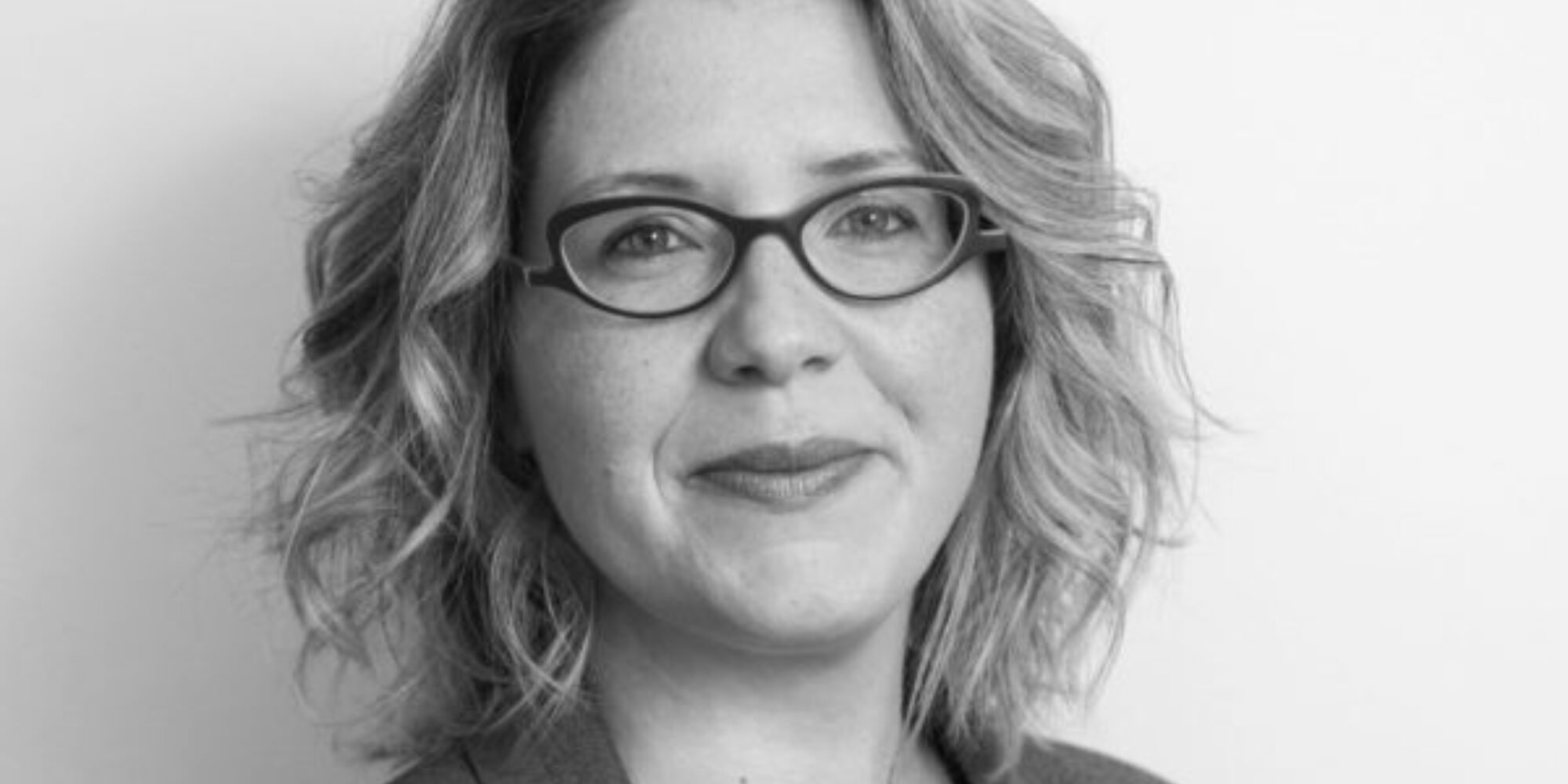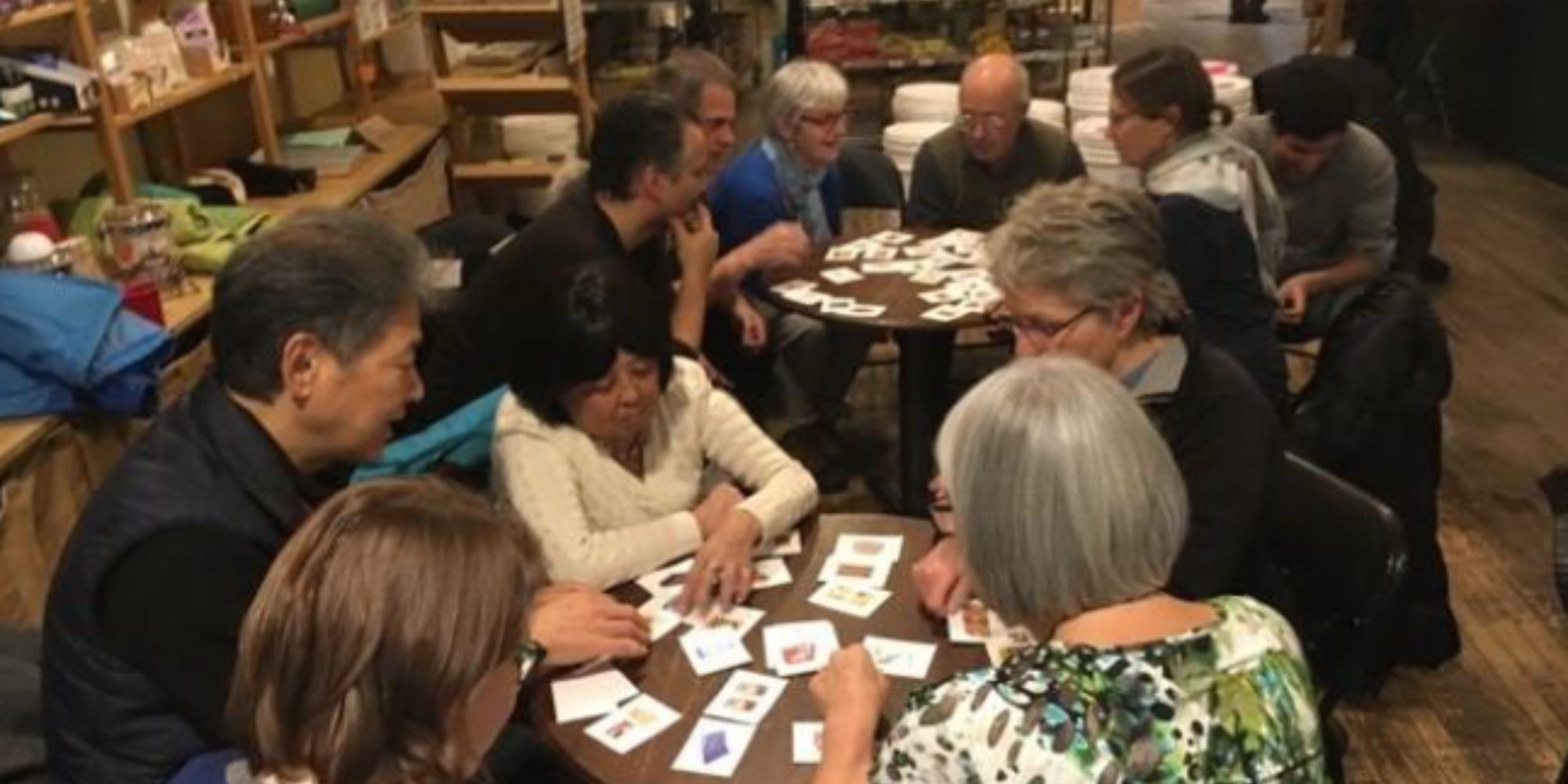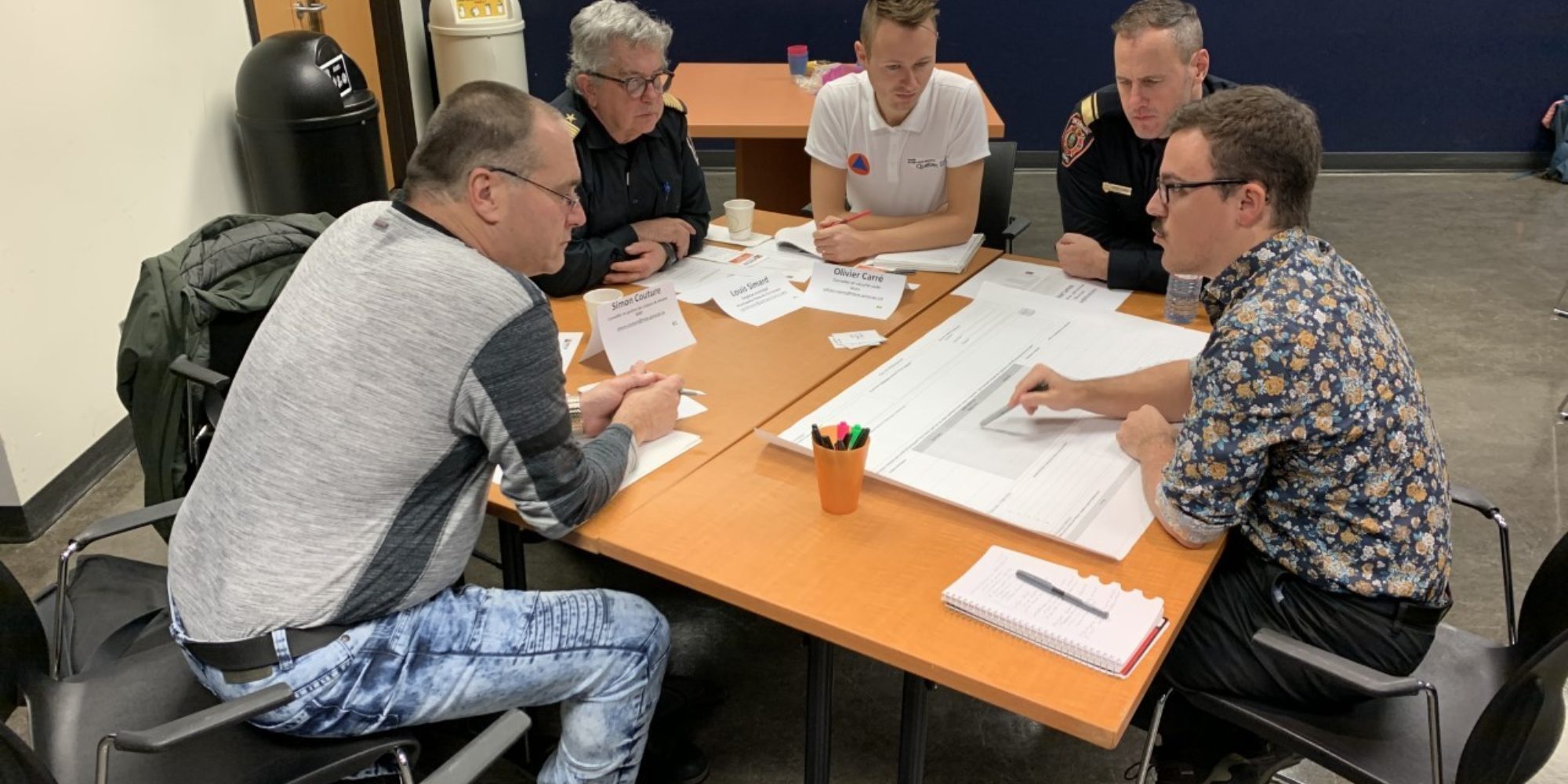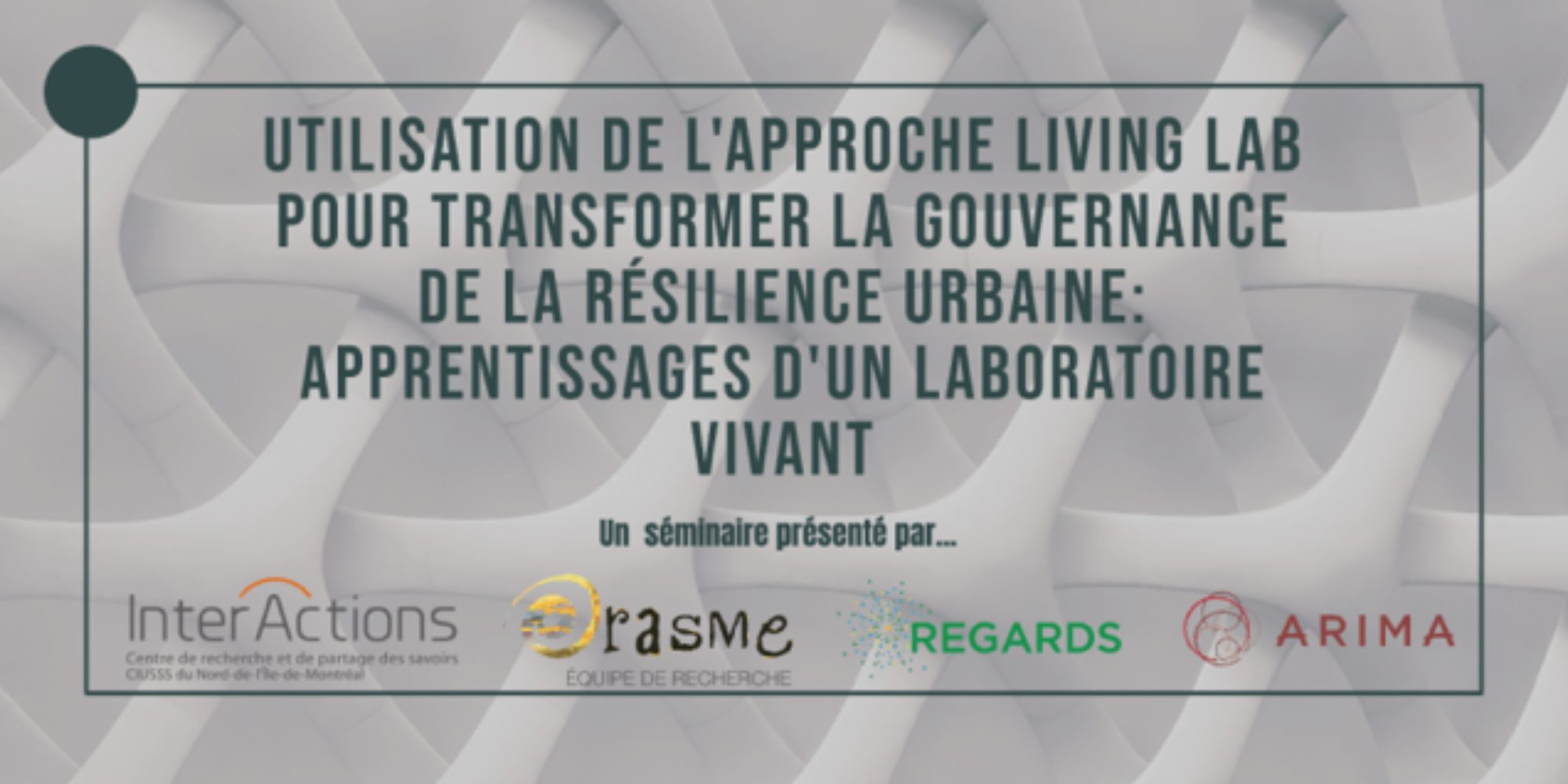Dec 18, 2020
Becoming a Resilient City in the Time of COVID-19

On December 9, Marie-Christine Therrien was invited to the radio show Je vote pour la science broadcast on Radio VM (91.3 FM). Marie-Christine spoke with host Isabelle Burgun about the response of Quebec cities to COVID-19. Is it easier to adapt when the municipality is less busy ? What is fundamental for adaptation? How can the public be involved in the changes that need to be made? How do we build a resilient city? To listen again to this segment of the program https://bit.ly/2WqEpo6 Photo: Conference “Resilient cities: new tools for local authorities”, Brussels, 2014....
Nov 26, 2020
Participation of Marie-Christine Therrien in a round table on AI and COVID-19

On October 30, Marie-Christine Therrien, director of the Cité-ID LivingLab and a professor at ENAP, took part in a round table organized by the International Observatory on the Societal Impacts of AI and Digital Technologies (OBVIA) on contact tracing applications developed in response to the COVID-19 pandemic. Participants in the roundtable analyzed the political, social and organizational challenges of these applications based on experience during the first wave of COVID-19.Learn more about this event : https://bit.ly/2TDt5DJ ...
Nov 26, 2020
Julie-Maude Normandin receives an international prize for her doctoral thesis

This week, the Chair in Crisis Management Research at the Université Technologique de Troyes (UTT) and the École Nationale Supérieure des Officiers de Sapeurs-Pompiers (France) awarded its International Prize to Julie-Maude Normandin for her thesis,“La sécurité civile en transformation : Analyse comparative de la conception et de la mise en œuvre de la résilience face aux désastres.” (Civil security in transformation: A comparative analysis of the conception and implementation of disaster resilience). The thesis aims to understand how the new concept of“resilience,” now very popular in the civil security domain, has transformed public policies for disaster management. Through an analysis of four case studies, Normandin finds that civil security actors first used resilience as a strategic concept to consolidate and improve their practices. Subsequently, the concept was employed to broaden their capacities for action to new areas. The...
Apr 8, 2020
A model “Recovery plan — Covid-19 pandemic” offered to Quebec municipalities

Post-crisis recovery is often neglected, which increases the consequences of an event, delays the return to normal and reduces learning. To better recover from the pandemic, the ASCQ offers Quebec municipalities a model of COVID-19 recovery plan.This new recovery plan is based on the initiative developed by the ASCQ and the Cité-ID LivingLab of ENAP-École nationale d’administration publique to improve the recovery practices of municipalities since 2019. This tool demonstrates the interest of combining practical and scientists knowledges to meet important challenges. This is why the Ville de Québec, the ASCQ and the Cité-ID have worked together to get this new tool adapted to the pandemic.Cité-ID researchers will also participate in the April 16 webinar on the presentation of the plan and the issues to be managed for collective recovery against the COVID-19.News release (Only in french) https://www.newswire.ca/fr/new…...
Mar 11, 2020
Social Capital Research Synthesis Report Unveiled

The Cité-ID Living Lab and the Maison de l’innovation sociale (MIS) have developed a research project to meet these objectives, in partnership with the City of Montréal, which aims to assess the relevance of the concept of social capital as a vector of urban resilience in different contexts.This project has three main objectives:1. to develop an appropriate tool for measuring social capital;2. to understand the mechanisms for creating social capital; and 3. to develop a tool for measuring social capital;3. to observe the mechanisms for institutionalizing the concept of social capital.The project was divided into three components, based on research sub-projects: Component 1: “Resilience and social capital : preparation for catastrophic events,” in partnership with Transition NDG;Component 2: “Resilience and social capital : youth”, with The YMCA of Québec’s C-Vert Program;Component 3: “Soupe locale Centre-Sud”, with the Corporation de développement communautaire Centre-Sud. Co...
Feb 23, 2020
Webinar presenting a Model Recovery Plan

On February 11, 2020, our team presented a practical tool for undertaking post-flood recovery in Québec. Working in collaboration with the Québec Civil Security Association and the Ministry of Public Security, Cité-ID presented a Model Recovery Plan. The aim of the webinar was to familiarize participants with the tools included in the Plan so that they might eventually adopt them and try them out in their territory. Each tool is supported by a users’ manual to facilitate understanding. Finally, the tools, which were designed with and for practitioners, aim to promote the development of innovative governance practices that will, in time, promote the resilience of municipalities.To consult the Model Recovery Plan (Only in French) To listen to the February 11, 2020 webinar (Only in French)...
Feb 18, 2020
Marie-Christine Therrien participates in the annual meeting of the American Association for the Advancement of Science

Professor and Director of the Cité-ID Living Lab, Marie-Christine Therrien participated in a scientific panel entitledUrban Resilience and Emergency Response: The Climate Change Perspective at last week’s annual meeting of the American Association for the Advancement of Science. The panel was organized by the Office of the Chief Science Officer of Québec and explored recent innovations to enable the evidence-based development of urban resilience. A summary of the panel is available here.Marie-Christine Therrien then led a workshop on the development of the Urban Science Advice Group with a group of 20 researchers and practitioners. The establishment of this group is being coordinated by the Fonds de recherché du Québec in collaboration with the ENAP’s Cité-ID Living Lab, at the request of the International Network for Government Science Advice (INGSA). The next INGSA conference will take place in Montréal next September....
Dec 11, 2019
Review of the second phase of the post-disaster recovery support process

Dozens of participants from Québec’s civil security community gathered on November 21 and 22, 2019, in Rimouski and Quebec City, and on December 2, 2019, in Repentigny, to participate in prototyping workshops. These workshops were part of the second phase of an action-research project initiated by the Civil Security Association of Québec (ASCQ) in partnership with the Minister of Public Security(MPS). The objective was to develop tools“by or for” civil security practitioners to facilitate the recovery phase following a disaster. Four prototypes were developed in the three workshops:1. a training module for elected officials, administrative staff and key partners;2. a model recovery plan;3. human resources management for recovery;4. plan to establish a community for the transfer of good practices led by the ASCQ to facilitate the creation, promotion and sharing of tools.To view the template used during...
Nov 25, 2019
Marie-Christine Therrien and research collaborators at Cité-ID co-authored a report, launched by the mayor of London, on strategic coordination for the European Counter-Terrorism Preparedness Network

Last week, the Counter-Terrorism Preparedness Network (CTPN) published four strategic reports aiming to share the knowledge and experience acquired by major European cities around protection and preparedness against terrorism. The report was launched by the mayor of London, Sadiq Khan, in the company of network partners. Professor Marie-Christine Therrien and two Cité-ID researchers, Joris Arnaud and Julie-Maude Normandin, contributed to the report on strategic coordination in the event of a terrorist attack. The report presents scientific knowledge along with the strategic coordination initiatives of six European cities, and offers a number of recommendations. The report was written in collaboration with four practitioners specialized in resilience and crisis management: Stockholm’s chief resilience coordinator, the chief of policy in Stockholm, as well as a manager and an employee from the London Resilience Group. The Counter-Terrorism Preparedness Network was created by the City o...
Nov 18, 2019
Living Lab Approach to Transforming Urban Resilience Governance: Learnings from a Living Lab

The Regard Laboratory, dedicated to research on local intersectoral networks, organized a seminar on Wednesday, November 6, 2019, at Université de Montréal to explain the purpose of the Living Lab approach to transform urban resilience governance. This seminar was presented by Julie-Maude Normandin, Research and Communication codirector of Cité-ID LivingLab. The aim of this presentation was to demystify the living lab approach which tends to spread in more and more areas. Julie-Maude also had the opportunity to explain the added value of this approach as well as the similarities and differences between this approach and other co-construction approaches. To learn more (Only in French)...














